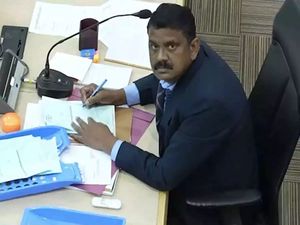A picture is worth a thousand words; how many words is a video worth? Perhaps you can’t weigh their worth in words, but two videos will go down in India’s political history as speaking a million or more words. One showed us what we didn’t want to see; the other what we didn’t want to believe.
The first was a 2001 clip that showed BJP boss Bangaru Laxman taking a cash bribe from a purported arms dealer. Neither was the amount large, nor did it show anything that we didn’t know. Those of us who vote, don’t vote or press NOTA these days know that many politicians take money for themselves or for their parties, but we were willing to condone the sin if there was no quid pro quo.
It was one thing to know the evil was there within us; it was another to see that evil in person. Seeing the act on camera was like Dr Jekyll seeing Mr Hyde in a mirror. The sight of the president of the ruling national party, which had been claiming to be a party with a difference, getting his palm openly greased with a measly sum in return for granting an arms deal shocked our middle-class sensibilities. We had thought that men at that level were beyond reproach or carried a higher price; the video told us they could be bought cheap. Anyway, Bangaru paid the high price.
We continued to believe that politicians may be corrupt, but the system that elects them isn’t. Now another video has come out, shattering the myth and making us shudder. It didn’t catch any politician with palms open or pants down; it caught a petty electoral officer in such a blatant act of rigging as to give company to Charles King in the hall of electoral ill-fame. King, if you don’t know, was elected president of Liberia in 1928 by a majority of 60,000, though the country had only 15,000 voters. Graham Greene recorded this in his 1935 travel account Journey Without Maps.
Anil Masih of Chandigarh is a much smaller man, but his crime qualified him for a place next to King. This nominated member of the town council was asked to conduct the mayoral poll, but he was caught in a video marking the ballots on his own. The video went viral two weeks ago, shocking the moral, ethical, political and judicial conscience of India.
If the Bangaru video showed what most of us knew was happening, the Masih video showed us what we thought wasn’t happening. Therein lies a paradox. The players on our electoral stage carry little credibility, but the directors of the play have always carried a high degree of credibility. Despite all the charges of booth-capturing, ballot box-stuffing and scientific rigging, Indian elections have enjoyed a high degree of credibility. We may have elected scoundrels at times, but the process by which scoundrels were elected has been beyond reproach.
It is this trust that a petty factotum has shaken to our deep anguish. And it was this anguish that made the majesty of the Supreme Court to intervene in what otherwise would have been dismissed in a corner of a newspaper column about a mayor poll in a distant town.
The BJP prides itself as an election-winning machine. Two years ago its national leaders went to campaign in Hyderabad’s town polls, saying they took even municipal polls seriously. Very good, gentlemen, that’s the way parties should conduct themselves. But some of your flunkeys are taking your words too seriously and too literally, and trying every trick in the book and outside it to ensure ‘victory’. Restrain them gentlemen, before more Masihs besmirch the good name of India, and turn it into a Liberia.
prasannan@theweek.in


